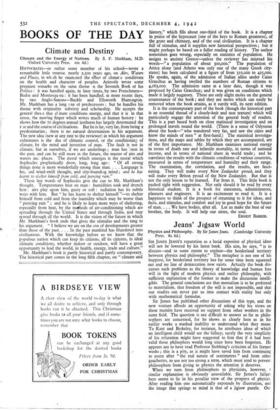Jeans' Jigsaw World
Physics and Philosophy. By Sir James Jeans. (Cambridge University Press. 8s. 6d.)
SIR JAMES JEANS'S reputation as a lucid expositor of physical ideas will not be lowered by his latest book. His aim, he says, " is to discuss—and to some extent to explore—the borderland territory between physics and philosophy." The metaphor is not one of his happiest, for borderland territory has for some time been squeezed out and no line of demarcation now exists. Actually the book dis- cusses such problems as the theory of knowledge and human free will in the light of modern physics and earlier philosophy, with sufficient explanation of the former to make the discussion intelli- gible. The general conclusions are that mentalism is to be preferred to materialism, that freedom of the will is not impossible, and that our studies can never put us into contact with reality but only with mathematical formulae.
Sir James has published other discussions of this type, and the new venture affords an opportunity of asking why his views on these matters have received no support from other workers in the same field. The question is not difficult to answer so far as philo- sophers are concerned, for he shows as clearly here as in his earlier works a marked inability to understand what they mean. To Kant and Berkeley, for instance, he attributes ideas of which an intelligent child would see the fallacy; surely the very simplicity of his refutation might have suggested to him that if it had been valid those philsophers would long since have been forgotten. He appears not to have read Professor Stebbing's criticism of his former works ; this is a pity, as it might have saved him from continuing to yearn after " the real nature of centimetres " and from other gaucheries, to use not too strong a term, which must tend to prevent philosophers from giving to physics the attention it deserves. When we turn from philosophers to physicists, however, a similar explanation is obviously unavailable. Sir James's failure here seems to lie in his peculiar view of the progress of physics. After reading him one automatically expounds by illustration, and the image that springs to mind is that of a jigsaw puzzle. Our present knowledge in physics corresponds to an advanced state of growth of the picture, and as fresh pieces are added two things happen—the picture becomes more completely revealed, and the jagged, uncompleted edge continually changes shape. The progress of the science can be represented without error or ambiguity by describing either the evolution of the picture or the successive forms of the edge, but whereas the first shows an almost continuous advance, the second shows a series of changes having no discernible regularity. Most physicists find significance in the growth of the picture: it is a picture. of ever expanding connexions, established beyond all reasonable likelihood of destruction, between what appear at first to be independent experiences ; so that, to take a simple example, by studying the silent effect of heat on air in a bottle we can predict how long after seeing a lightning stroke at a given point the thunder will be heard, according to a watch rated by the stars. Such relations, once established, are established for ever, though the terms in Which they are expressed may change ; and the philosophical importance of physics lies in the steadily increasing correlation of experiences of dissimilar kinds.
To all this Sir James Jeans gives no heed. He focuses attention on the protean edge of the picture, and takes delight in its un- predictable and irrational changes. In The Mysterious Universe (1930) he told us that " nature abhors accuracy and precision above all things." Another small piece has been added, and he now says " Indeterminism . . . is not a property of nature but of our way of looking at nature." In The New Background of Science (1933) we read " The wave picture . . . is nowhere known to fail, and so may provide the true gateway to reality." Now, however, it appears that " our studies can never put us into contact with reality, and its true meaning and nature must be forever hidden from us." He invariably describes the edge of the picture in positive terms, but qualifies them all at the end by a saving clause. Thus, notwith- standing the conclusion of The Mysterious Universe (" Our main contention can hardly be that the science of today has a pronounce- ment to make, perhaps it ought rather to be that science should leave off making pronouncements : the river of knowledge has too often turned back on itself.") and of The New Background of Science ("Yet who shall say what we may find awaiting us round the next corner? "), he tells us now that " Heisenberg's scheme, from the mode of its derivation, is necessarily true to reality," but again sums up : " If we must state a conclusion, it would be that many of the former conclusions of nineteenth-century science on philosophical questions are once again in the melting-pot. Just because of this, we cannot state any positive conclusions of any kind."
All this is of little help to the thinker, whether or not he calls himself philosopher, who hopes to learn from physics something relevant to the fundamental problems of experience. Such a one, however, may be assured that there is another aspect of physical progress which has significance for him. HERBERT DINGLE.



























 Previous page
Previous page